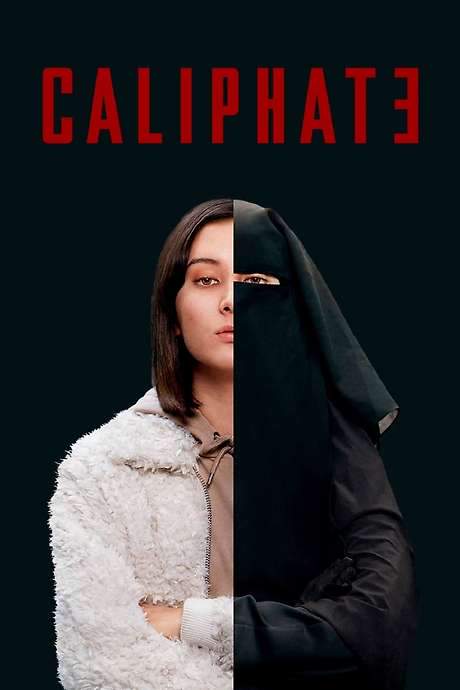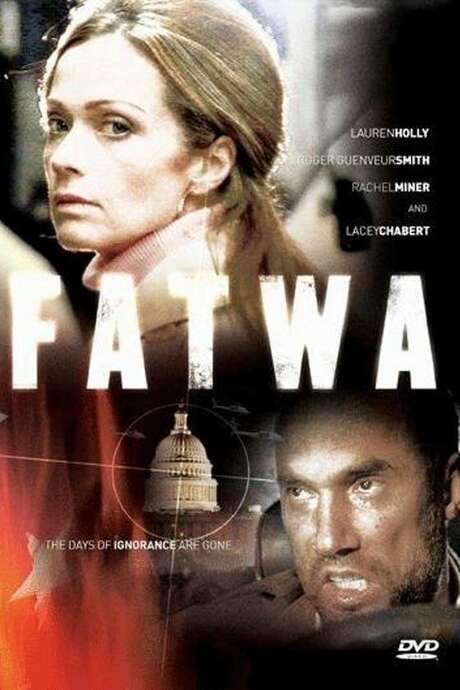
Caliphate
Year: 1000
Runtime: 360 mins
Language: Swedish
Director: Goran Kapetanović
National Security agent Fatima follows a tip about a planned terrorist attack on Sweden. Meanwhile, teenage Sulle in Stockholm becomes drawn to her student assistant, who opens a radical new worldview. The thriller tracks the intertwined lives of five young women as they are pulled into the seductive destructive force of religious fundamentalism.
Warning: spoilers below!
Haven’t seen Caliphate yet? This summary contains major spoilers. Bookmark the page, watch the movie, and come back for the full breakdown. If you're ready, scroll on and relive the story!
Caliphate (1000) – Full Plot Summary & Ending Explained
Read the complete plot breakdown of Caliphate (1000), including all key story events, major twists, and the ending explained in detail. Discover what really happened—and what it all means.
Pervin [Gizem Erdogan] is a young Muslim woman from Sweden who lives in Raqqa, the ISIS-controlled capital of Syria, with her husband Husam [Amed Bozan] and their newborn daughter Latifa. Feeling estranged from life under occupation, she resolves to return home. After quietly obtaining a cell phone from a neighbor, she reaches out to Dolores [Monica Albornoz], an anti-radicalization activist in Sweden, who in turn connects her with Fatima [Aliette Opheim], a Swedish Security Service agent who is at odds with her own leadership after a troubling incident involving a figure named Lorentz. Fatima speaks to Pervin by phone, and proposes a dangerous bargain: she will help with a safe return to Sweden for Pervin, Husam, and Latifa in exchange for details about a looming terror attack. The exchange sets off a tense, paranoid dance between fear, loyalty, and duty as Pervin tries to navigate the line between survival and complicity.
Pervin tells Fatima about a mysterious figure known as Al Musafir, or the Traveler, who is supposedly planning the attack from within Sweden. Al Musafir is Ibrahim Haddad, known to his recruits as Ibbe, a high school teacher’s assistant who has deftly woven himself into a network of eager followers. Ibbe has pulled two brothers into his orbit—Jakob, a former prisoner with a troubled past, and Emil, the younger sibling who battles mental health issues—though the brothers’ relationship with their mother adds a layer of friction to the family dynamics that Ibbe exploits. Ibbe’s reach expands to Miryam, a girl raised in Baghdad, whom he promises to marry off in exchange for her help. Ibbe’s strategy hinges on shaping vulnerable youths to see the Caliphate as a place of power and belonging.
Ibbe’s method involves a troubling indoctrination of young girls at the school, where he shows ISIS recruitment videos and channels the fantasy of luxury and belonging in a distant, idealized Islamic state. Two girls drawn into the circle are Sulle [Nora Rios] and Kerima [Amanda Sohrabi], both 15, who begin wearing the hijab and absorbing lessons framed as Sharia law. The lure of “better lives” and a sense of purpose overrides the ordinary pressures they face at home. Sulle’s parents grow anxious and attempt to intervene, even threatening to marry her off to a relative in Jordan to break the radical pull. In a grim turn, Sulle’s radicalization begins to draw in her younger sister, Lisha [Yussra El Abdouni], though the implications of that shift are not fully understood at the time. Kerima, who endures the violence of an alcoholic father with PTSD after combat service, finds refuge with Ibbe as he intensifies his indoctrination.
Fatima keeps her source a secret from her superiors, offering only vague details about the plot. Her supervisors want her to step back, and she faces consequences for a cannabis incident, yet she persists, staying in touch with Calle, a colleague at the Security Service who shares the sense that the threat runs deeper than official channels acknowledge. Fatima continues sifting through Pervin’s information, trying to cast a clearer line from a shooting range to a broader conspiracy, and she begins tracing Jakob and Emil through the license plates and movements that Pervin reveals.
Dolores and Ibbe attend an anti-radicalization meeting, where a crucial clue surfaces when Dolores notices a tattoo on Ibbe’s forearm that appears in the ISIS video. Later, at a cafe, Dolores recognizes the tattoo on Ibbe and tries to relay the information to Fatima. When Dolores goes to pass on the message, she is stabbed and killed, which triggers a rapid police response. Fatima arrives to find the aftermath of a deadly confrontation and, suddenly, becomes a person of interest herself as she attempts to flee the ensuing investigation. She hides in the residence of a colleague of her father, seeking a way to protect Pervin and the others while evading a pursuit that intensifies by the hour.
Pervin’s precarious situation worsens when Ahmed, one of Husam’s colleagues, confronts her at night, intrusively intruding into her life and trying to exert control. He assaults her and is about to kill her, but Pervin defends herself with a weapon and kills him, stashing the body in a neighbor’s well. Husam, under the influence of sleeping pills, wanders into the kitchen and sees blood—an impression that will haunt him as Pervin later reveals the truth. The aftermath shifts the balance of trust: Fatima, determined to protect the wider plan, schemes to extract Pervin and her family from Raqqa, while Sulle and Kerima’s fate becomes increasingly intertwined with Ibbe’s broader designs.
As the clock ticks, Sulle and Kerima secure plane tickets to Turkey, with Ibbe orchestrating their departure. Sulle’s sister Lisha accompanies them for the journey, and the family’s fear escalates as Suleiman, Lisha’s father, who often speaks against religious fervor, attempts to keep track of his daughters from afar. A chain of actions leads Calle to mobilize authorities across Germany and Turkey, and a tense chase unfolds as the sisters’ passports are swapped, redirecting their path toward Ankara rather than Istanbul. The rescue operation succeeds for Sulle and Kerima, while Lisha’s fate remains uncertain as she is on the way toward Syria.
Calle persuades Fatima to seek assistance from Pervin to rescue Lisha, and the plan evolves into a promise: Pervin would return to Syria to help evacuate all of them. To secure that promise, Pervin convinces Husam to marry Lisha as his second wife, a decision that reflects the web of coercion, fear, and desperate bargaining that defines the characters’ movements. Jakob’s influence lingers as he fatally stabs his mother in his flight from the law, and Fatima continues to pursue Jakob and Emil, only to lose the trail when they switch cars. Fatima is captured just as the window to intervene closes, and she must bargain for her freedom with the information she has gathered. In exchange for leniency, she agrees to help extricate Husam, Pervin, and Lisha from the safety of a precarious escape.
The security service has been aware of the broader plot all along, and their knowledge ultimately prevails. Ibbe detonates a bomb in a garage and escapes by blending into a crowd, slipping away in disguise. Fatima finally travels to Syria with a plan to rescue Pervin, Lisha, and Husam. Just as they near safety, Omar—Husam’s colleague—arrives to push Husam toward a suicide mission. Lisha, now thoroughly radicalized beyond her sister, reveals the escape plan to Omar, who shoots Pervin in the back and seems ready to shoot Husam as well. Fatima arrives in time to shoot Omar dead and pull the others to safety. They reach the border and exit Raqqa, but not before Pervin succumbs at the border crossing. Fatima carries Husam and the traumatized Lisha away from danger, while Lisha’s future remains uncertain, a stark reminder of the price paid for trying to outrun extremism.
In the aftermath, Sulle and Kerima endure interrogations by the Security Service. Sulle, seeking to shield her sister, reveals Ibbe’s identity, while Kerima confronts the deepening despair and attempts suicide while in a mental health facility. Calle returns to the school to capture Ibbe, yet Ibbe evades him, and Kerima reconnects with Ibbe, agreeing to participate in a renewed attack targeting a girls’ concert. Kerima is equipped with a suicide vest, and Ibbe tries to maintain a belief that Sulle is part of the plot, a lie that threatens to destroy the fragile sense of trust between them. At the concert, Kerima is unable to remove the vest, warns others to flee, and has a final, heartrending exchange with a tearful Sulle over the phone. In the end, Ibbe detonates the bomb, sacrificing Kerima and sealing Ibbe’s brutal plan in a final, devastating act. The film closes on the stark consequences of radicalization: innocence lost, families strained beyond repair, and the international effort to disrupt terror unfolding against the backdrop of a fragile, uneasy peace.
Last Updated: November 25, 2025 at 01:01
Explore Movie Threads
Discover curated groups of movies connected by mood, themes, and story style. Browse collections built around emotion, atmosphere, and narrative focus to easily find films that match what you feel like watching right now.
Thrillers with relentless conspiracies like Caliphate
Fast-paced stories where heroes race against time to stop catastrophic plots.If you enjoyed the high-tension investigation and race against time in Caliphate, these movies deliver similar experiences. This list features movies like Caliphate with fast-paced plots, high-stakes political or terrorist threats, and intelligence agents working against impossible odds to prevent catastrophe.
Narrative Summary
Stories typically follow a central investigator or agent uncovering a complex, widespread conspiracy. The plot is driven by a series of urgent discoveries, close calls, and escalating threats, culminating in a final, desperate attempt to thwart the plan. The narrative structure is often linear but information is revealed strategically to maintain maximum suspense.
Why These Movies?
These films are grouped by their shared breakneck pacing and persistent high-intensity atmosphere. They all center on a credible, large-scale threat that creates a pervasive sense of anxiety and urgency, pulling the audience into the protagonist's desperate struggle.
Movies about dark manipulation like Caliphate
Disturbing journeys into how vulnerable minds are seduced by destructive ideologies.Fans of Caliphate's exploration of radicalization and psychological manipulation will find similar themes here. These movies, like Caliphate, delve into bleak stories of vulnerable characters being drawn into destructive worlds, resulting in heavy emotional weight and tragic outcomes.
Narrative Summary
The narrative follows the point of view of the manipulated individual, charting their gradual alienation from their old life and seduction into a new, extreme worldview. The story contrasts their initial innocence with their eventual radicalization, often showing the devastating impact on their family and loved ones. The arc is typically a downward spiral ending in tragedy or profound loss.
Why These Movies?
These films share a core focus on the mechanics of psychological manipulation and its traumatic human cost. They are united by a grim, oppressive tone, heavy emotional weight, and a commitment to portraying the bleak reality of ideological seduction without sugarcoating the outcomes.
Unlock the Full Story of Caliphate
Don't stop at just watching — explore Caliphate in full detail. From the complete plot summary and scene-by-scene timeline to character breakdowns, thematic analysis, and a deep dive into the ending — every page helps you truly understand what Caliphate is all about. Plus, discover what's next after the movie.
Caliphate Timeline
Track the full timeline of Caliphate with every major event arranged chronologically. Perfect for decoding non-linear storytelling, flashbacks, or parallel narratives with a clear scene-by-scene breakdown.

Characters, Settings & Themes in Caliphate
Discover the characters, locations, and core themes that shape Caliphate. Get insights into symbolic elements, setting significance, and deeper narrative meaning — ideal for thematic analysis and movie breakdowns.

Caliphate Spoiler-Free Summary
Get a quick, spoiler-free overview of Caliphate that covers the main plot points and key details without revealing any major twists or spoilers. Perfect for those who want to know what to expect before diving in.

More About Caliphate
Visit What's After the Movie to explore more about Caliphate: box office results, cast and crew info, production details, post-credit scenes, and external links — all in one place for movie fans and researchers.

Similar Movies to Caliphate
Discover movies like Caliphate that share similar genres, themes, and storytelling elements. Whether you’re drawn to the atmosphere, character arcs, or plot structure, these curated recommendations will help you explore more films you’ll love.
Explore More About Movie Caliphate
Caliphate (1000) Scene-by-Scene Movie Timeline
Caliphate (1000) Movie Characters, Themes & Settings
Caliphate (1000) Spoiler-Free Summary & Key Flow
Movies Like Caliphate – Similar Titles You’ll Enjoy
The Kingdom (2007) Full Summary & Key Details
Walid (2023) Movie Recap & Themes
Domino (2019) Full Summary & Key Details
The Rhythm Section (2020) Full Movie Breakdown
Stockholm (2019) Full Summary & Key Details
Haider (2014) Ending Explained & Film Insights
The Algerian (2015) Detailed Story Recap
Kaafir (1000) Full Summary & Key Details
Infidel (2019) Spoiler-Packed Plot Recap
Fatwa (2006) Story Summary & Characters
Qayamat: City Under Threat (2003) Plot Summary & Ending Explained
Dus (2005) Detailed Story Recap
The Terrorist (1994) Detailed Story Recap
Terrorism and Kebab (1992) Detailed Story Recap
Sinjar (2022) Complete Plot Breakdown













































